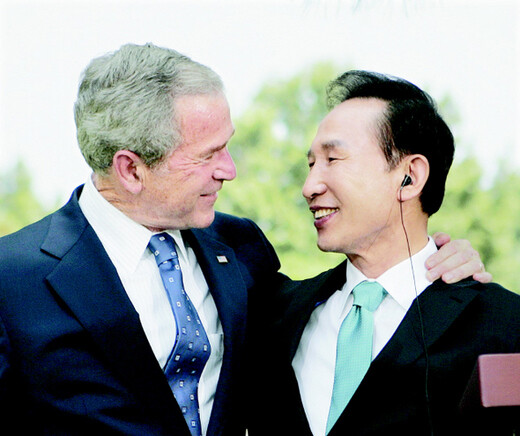hankyoreh
Links to other country sites 다른 나라 사이트 링크
Lee and Bush produce joint statement on N. Korean human rights

President Lee Myung-bak and U.S. President George W. Bush said Wednesday that there needed to be meaningful progress in the North Korean human rights situation during the course of normalizing ties between North Korea and the United States.
The two leaders stressed this point in a joint statement issued after their meeting at Cheong Wa Dae, or the Blue House. The two said they were committed to helping North Korea become a member of the international community so it could take part in peace and prosperity on the Korean Peninsula and in Northeast Asia. This is the first time the North Korean human rights issue has been included in a document encapsulating the results of a South Korea-U.S. summit.
This is likely to have an additional negative influence on inter-Korean relations as North Korea is expected to slam it as interference in its internal affairs. This is because, while the North Korean human rights issue has been raised during previous South Korea-U.S. summits, this is the first time it has been put into writing.
The United States was the first side to propose that the North Korean human rights issue be included in the joint statement. The government said the United States proposed it, and Korea accepted. The Korean government did not bring up the matter to put pressure on North Korea, it is saying.
The Bush administration has long emphasized that an improvement in the North Korean human rights situation is a requirement for the normalization of ties between Washington and Pyongyang. It appears the recent U.S. political situation, with conservatives criticizing Bush for not raising the North Korean human rights issue and being excessively accommodating to Pyongyang, has played a role in the U.S. side calling for the human rights issue to be included in the joint statement. Representative of this situation is the U.S. Congress’s withholding confirmation of the designated U.S. ambassador to Korea, Kathleen Stephens.
Nevertheless, there is room for controversy in Korea’s immediate acceptance of the U.S. request. This is not the first time the United States has worked to get the North Korean human rights issue into post-summit joint statements. The Kim Dae-jung and Roh Moo-hyun administrations took great pains to avoid this, taking inter-Korean relations into consideration. The only example of the issue being mentioned was an indirect reference to it in the joint statement that followed the November 2005 Korea-U.S. summit in Gyeongju; the document said the two leaders had exchanged opinions on the situation of the North Korean people and looked for ways to improve their circumstances.
Kim Yeon-cheol, the director of the Hankyoreh Peace Institute, said Seoul’s expression of its intent to cooperate with the United States on the North Korean human rights issue even after the stir caused by the ASEAN Regional Forum chairman’s statement would have a negative impact on efforts to restart inter-Korean intergovernmental talks by strengthening North Korean distrust of the South.
In the joint statement, Bush expressed his full support for Lee’s North Korea initiatives, including his calls for North Korea to join inter-Korean government-to-government talks to quickly resolve the Mount Geumgang (Kumgang) shooting incident and prevent a reoccurrence. A Korean official said this had been done to fundamentally block North Korea’s strategy of trying to talk to the United States while isolating the South. Yet popular opinion is that in the course of this summit it would have been tough to have found an opportunity to bring positive change by abandoning the current situation, in which the North Korea-U.S. dialogue continues through the six-party talks while inter-Korean dialogue has been severed.
Please direct questions or comments to [englishhani@hani.co.kr]
Editorial・opinion
![[Column] Season 2 of special prosecutor probe may be coming to Korea soon [Column] Season 2 of special prosecutor probe may be coming to Korea soon](https://flexible.img.hani.co.kr/flexible/normal/500/300/imgdb/original/2024/0426/3317141030699447.jpg) [Column] Season 2 of special prosecutor probe may be coming to Korea soon
[Column] Season 2 of special prosecutor probe may be coming to Korea soon![[Column] Park Geun-hye déjà vu in Yoon Suk-yeol [Column] Park Geun-hye déjà vu in Yoon Suk-yeol](https://flexible.img.hani.co.kr/flexible/normal/500/300/imgdb/original/2024/0424/651713945113788.jpg) [Column] Park Geun-hye déjà vu in Yoon Suk-yeol
[Column] Park Geun-hye déjà vu in Yoon Suk-yeol- [Editorial] New weight of N. Korea’s nuclear threats makes dialogue all the more urgent
- [Guest essay] The real reason Korea’s new right wants to dub Rhee a founding father
- [Column] ‘Choson’: Is it time we start referring to N. Korea in its own terms?
- [Editorial] Japan’s rewriting of history with Korea has gone too far
- [Column] The president’s questionable capacity for dialogue
- [Column] Are chaebol firms just pizza pies for families to divvy up as they please?
- [Column] Has Korea, too, crossed the Rubicon on China?
- [Correspondent’s column] In Japan’s alliance with US, echoes of its past alliances with UK
Most viewed articles
- 1AI is catching up with humans at a ‘shocking’ rate
- 2After election rout, Yoon’s left with 3 choices for dealing with the opposition
- 3Is Japan about to snatch control of Line messenger from Korea’s Naver?
- 4No good, very bad game for Korea puts it out of Olympics for first time since 1988
- 51 in 5 unwed Korean women want child-free life, study shows
- 6Will NewJeans end up collateral damage in internal feud at K-pop juggernaut Hybe?
- 7Korea’s 1.3% growth in Q1 signals ‘textbook’ return to growth, says government
- 8Marriages nosedived 40% over last 10 years in Korea, a factor in low birth rate
- 9[Editorial] Japan’s rewriting of history with Korea has gone too far
- 10Why Korea shouldn’t welcome Japan’s newly beefed up defense cooperation with US